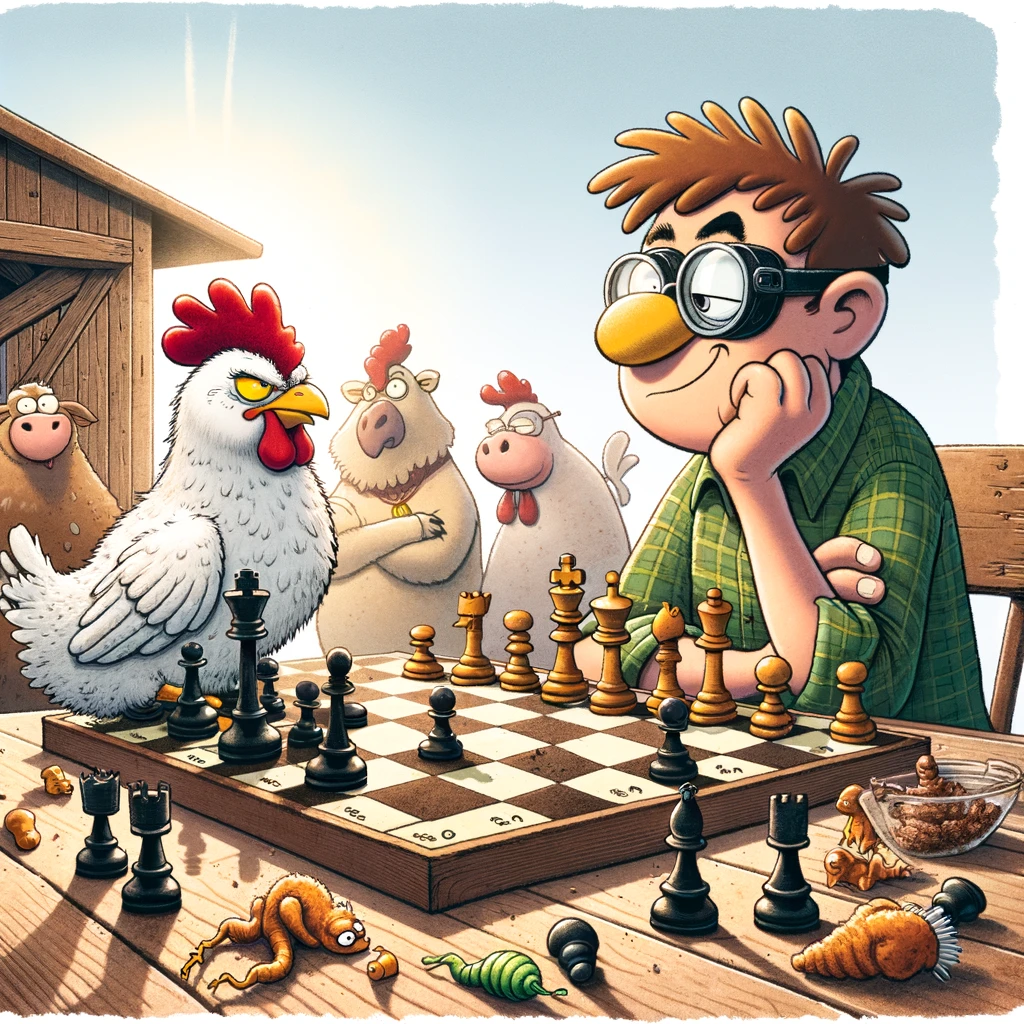Have you ever found yourself in the predicament of being challenged to a game of chess by a cocky, overconfident chicken? It’s a situation we’ve all been in at one point or another. But never fear, dear reader! With the right strategy, mindset, and a dash of absurdity, you too can emerge victorious against your feathered foe.
Understanding Your Opponent Before we dive into the nitty-gritty of chess strategy, it’s crucial to understand the unique challenges posed by a chicken opponent.
- Chickens have a notoriously short attention span. They may get distracted by a particularly juicy worm or a shiny object mid-game.
- They have a tendency to peck at the pieces, which can be both annoying and unsanitary.
- Chickens are masters of psychological warfare. Their unblinking stare and occasional clucking can be unnerving.
- They may attempt to cheat by hiding pieces in their feathers or “accidentally” knocking over the board.
Despite these challenges, remember that you have the advantage of opposable thumbs and a (presumably) larger brain. Use these to your advantage!
Setting the Stage Creating the right environment is key to your success.
- Choose a quiet, distraction-free location. A busy barnyard may lead to interruptions from other curious fowl.
- Ensure the chess board is at a comfortable height for both you and your chicken opponent. You don’t want to strain your back hunching over, and the chicken should be able to reach the pieces without jumping.
- Use a sturdy chess set. Flimsy plastic pieces are more likely to be knocked over or carried away by a mischievous beak.
- Consider wearing protective gear. Safety goggles can protect your eyes from stray feathers or an unexpected peck.
With the stage set, it’s time to outwit your poultry adversary.
Opening Moves The opening moves of a chess game are crucial for setting the tone and establishing your strategy.
- Start with a classic opening like the “Egghead’s Gambit” or the “Chicken Sicilian Defense.” These openings are known to be particularly effective against avian opponents.
- Keep an eye out for any unusual moves from your chicken. They may try to open with something unorthodox like the “Peck and Run” or the “Feather Frenzy.”
- Don’t be afraid to think outside the box. Remember, you’re playing against a chicken, so normal chess rules may not apply.
If you can establish a strong position in the opening moves, you’ll be well on your way to victory.
Mid-Game Strategy As the game progresses, it’s important to adapt your strategy based on your chicken’s play style.
- If your chicken seems easily distracted, try to create complex positions that will confuse and overwhelm them.
- If they’re prone to aggressive pecking, keep your valuable pieces protected and let them wear themselves out on your pawns.
- Use your superior intellect to anticipate their moves. Chickens are notoriously bad at long-term planning, so use this to your advantage.
- Don’t be afraid to sacrifice pieces if it means gaining a strategic advantage. Your chicken may be distracted by the chance to capture a piece, allowing you to set up a winning move elsewhere on the board.
Remember, the mid-game is all about adaptability and thinking several moves ahead.
Endgame Tactics As you near the end of the game, it’s time to bring out your most cunning tactics.
- If you find yourself in a position where you’re down on material, try to create a complex endgame that will be difficult for your chicken to navigate. They may get frustrated and resign out of sheer confusion.
- Use your knowledge of chess theory to your advantage. Your chicken likely hasn’t studied endgame positions in depth, so use this to outmaneuver them.
- If all else fails, try to distract your chicken with a well-timed treat toss or a sudden loud noise. While they’re investigating the disturbance, quickly make your winning move.
With these endgame tactics in your arsenal, you’ll be able to close out the game and claim victory over your feathered foe.
Dealing with Defeat Despite your best efforts, there may come a time when you find yourself on the losing end of a game against a chicken. It’s a humbling experience, but it’s important to handle defeat with grace and sportsmanship.
- Congratulate your chicken on a game well played. Offer them a firm handshake (or wing shake, as the case may be).
- Analyze the game to see where you went wrong. Did you underestimate your chicken’s tactical abilities? Did you fall for a particularly clever feint?
- Use the loss as motivation to improve your game. Study chess theory, practice against other (non-avian) opponents, and come back stronger next time.
Remember, losing to a chicken at chess is not the end of the world. It’s an opportunity to learn, grow, and come back stronger.
Famous Chicken Chess Masters Throughout history, there have been a handful of chickens who have risen to the top of the chess world. These feathered prodigies have bested human grandmasters and left their mark on the game.
- Henrietta the Hen: Known for her aggressive playing style and signature move, the “Peck and Check,” Henrietta dominated the chicken chess circuit in the 1950s.
- Cluck Norris: With a name that strikes fear into the hearts of his opponents, Cluck Norris is a current top-ranked chicken chess player known for his unorthodox and unpredictable moves.
- Eggbert Einstein: A brilliant strategist, Eggbert Einstein is known for his ability to think several moves ahead and his fondness for the “Egghead’s Gambit” opening.
- Poultry-akov: Named after the famous Russian grandmaster, Poultry-akov is a rising star in the chicken chess world known for his deep understanding of positional play.
These chess-playing chickens serve as an inspiration to us all, reminding us that with dedication and practice, anyone (or any bird) can become a chess master.
Frequently Asked Questions
Q: Can chickens really play chess? A: While chickens are intelligent birds, they do not have the cognitive abilities required to play chess at a high level. This blog post is purely satirical and not meant to be taken seriously.
Q: What should I do if my chicken opponent poops on the chess board? A: Remain calm and clean up the mess as best you can. Consider investing in a chess set with easy-to-clean pieces and a wipeable board for future games.
Q: Is it unethical to play chess against a chicken? A: As long as the chicken is treated humanely and not forced to play against its will, there is nothing inherently unethical about playing chess with a chicken. However, it’s important to remember that chickens have their own unique needs and preferences, and their well-being should always be a top priority.
Q: Can I train my own chicken to play chess? A: While it’s unlikely that you’ll be able to train your chicken to play chess at a high level, you can certainly try to teach them the basic rules and moves. Just be patient and remember that every chicken learns at their own pace.
Conclusion Playing chess against a chicken can be a humbling, frustrating, and downright bizarre experience. But with the right strategy, mindset, and a healthy dose of humor, you too can emerge victorious against your feathered opponent.
Remember to:
- Understand your chicken’s unique playing style and quirks
- Create a conducive environment for the game
- Adapt your strategy based on your chicken’s moves
- Use your superior intellect and opposable thumbs to your advantage
- Handle defeat with grace and use it as a learning opportunity
And most importantly, have fun! Chess is a game, after all, and playing against a chicken is an experience you’ll never forget.
So the next time you find yourself face to beak with a chicken across the chess board, remember the tips and strategies you’ve learned here. With a little luck and a lot of patience, you’ll be able to outmaneuver your poultry opponent and claim victory in the noble game of chicken chess.
Now if you’ll excuse me, I have a particularly persistent pigeon who’s been pestering me for a game of backgammon. Wish me luck!
Recent Posts
Times Square, the beating heart of New York City, is like a giant disco ball that never stops spinning. It's a place where the neon lights are so bright, you'll need sunglasses at midnight. The...
In a world where water is becoming scarcer than a unicorn's tears, organic farmers are taking matters into their own hands. They're ditching the old-school methods of drowning crops in a deluge of...

